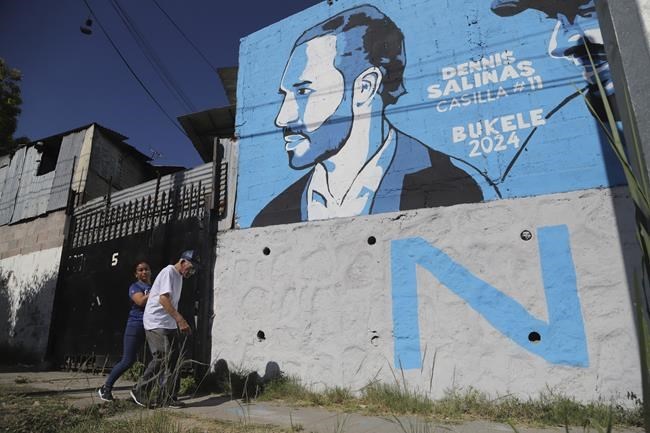
A woman guides an elderly man through the imperfections on a sidewalk past a New Ideas campaign mural promoting President Nayib Bukele who is running for re-election, in the Mejicanos suburb of San Salvador, El Salvador, Wednesday, Jan. 24, 2024. El Salvador will hold a general election on Feb. 4 where voters will elect a president, vice president and members of Congress. (AP Photo/Salvador Melendez)
February 05, 2024 - 12:36 PM
MEXICO CITY (AP) — El Salvador’s Nayib Bukele has called himself the “world’s coolest dictator” or as his X profile read on election day, the “Philosopher King.”
Now he’ll likely have five more years to provoke, surprise and raise concerns, after appearing to win a landslide reelection as the Central American country’s president. Preliminary and partial results Monday suggested Bukele had romped to victory Sunday over the country’s thoroughly discredited traditional parties from the right and left.
Bukele is a millennial of the we-have-to-break-things mentality, and he shuns ideology. He is a populist in a long line of Latin American populists, but with a mastery of social media, communication and publicity seldom seen before.
A look at some things he did in his first term:
Consolidating Governmental Power
In February 2020, Bukele entered the Legislative Assembly with rifle-toting soldiers after lawmakers balked at approving a security loan proposal. The symbolism of Bukele taking the seat of the chamber’s president backed by the military was powerful.
In April of that year, early in the coronavirus pandemic, police began taking violators of his stay-at-home orders to quarantine centers for up to 30 days. When the Supreme Court said that violated the Constitution. Bukele vowed to ignore the ruling and tweeted: “It is one thing to interpret the Constitution, and another very different thing to order the murder of people.” Human rights groups later said the detentions continued.
When Bukele's party took control of the congress the following year, lawmakers quickly purged the Supreme Court’s constitutional chamber, which had ruled against Bukele on several occasions.
The new court interpreted the constitution differently when it came to an apparent ban on consecutive reelection. In September 2021 it ruled that such a reelection was not prohibited and ordered the Supreme Electoral Tribunal to allow a second term.
Defanging the Gangs
Bukele was not the first president of El Salvador to negotiate with the gangs that held an iron grip on its streets. But when local media reported that Bukele’s administration was not only negotiating but granting gang leaders benefits in return for maintaining a lower level of bloodshed, Bukele vehemently denied it.
Then in 2022, the carnage of March 26 happened. Gangs killed 62 people in a single day across the country, a toll not seen for years. Bukele sought and received special powers: arrests without warrants, no access to a lawyer, broad authority to intercept communications.
Any secret negotiations were replaced by a highly publicized crackdown. Thousands of troops surrounded neighborhoods or entire towns. They went door-to-door grabbing people. Some police spoke of having to meet arrest quotas as Bukele tweeted how many people had been arrested each day and shared slick videos of nearly naked inmates frog-marched across prison yards.
Nearly two years later, more than 76,000 people have been arrested under that authority, which the congress continues to extend every month. The government has acknowledged at least 7,000 were mistakenly swept up and later released. Human rights groups have documented dozens of deaths of people inside prisons who had not yet been tried.
Bringing Safety to the Streets
The crackdown has been tough, but people have reclaimed their neighborhoods.
Small businesses are no longer extorted into oblivion. People can safely seek jobs in neighborhoods formerly controlled by rival gangs. Children can walk to school without fear of forced gang recruitment.
That is Bukele’s justification. Those who criticize the gang crackdown are defending gangsters, he says. Those who talk of human rights were absent when gangs maintained dominion over swaths of the country, he says.
On Sunday, Bukele pushed back at critics. El Salvador has gone from having among the highest homicide rates in the world a decade ago to being one of the safest countries in the Western Hemisphere, he said.
“So I believe that El Salvador, after half a century of suffering, now is our time to move forward,” Bukele said.
News from © The Associated Press, 2024